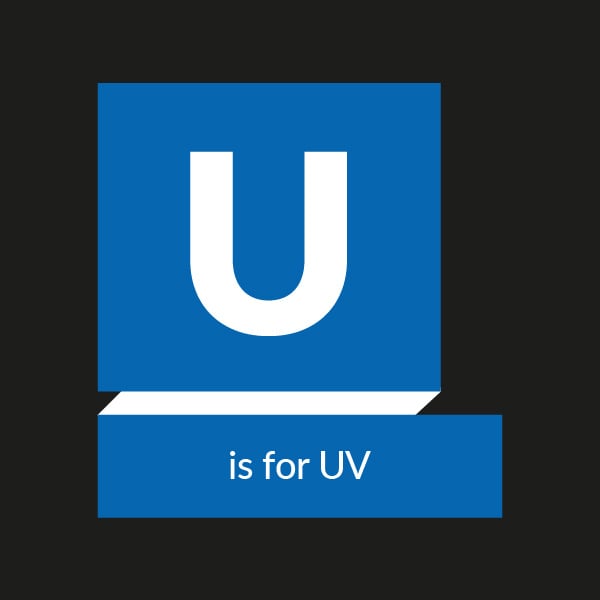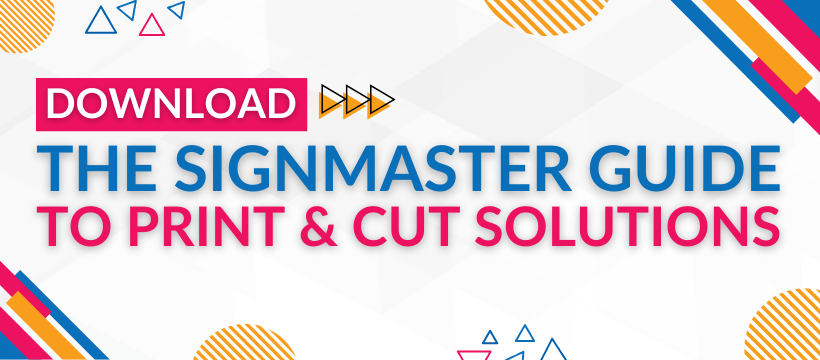
Our A to Z Guide to Wide Format - U is for UV
Applications, Bleed, RIP Software…. We get asked lots of questions about the world of Wide Format on a daily basis. At Signmaster we are here to help and our lovely team of experts have pulled together a handy A to Z guide answering the most frequently asked questions.
Introducing the Signmaster A to Z of Wide Format.
This is a series of helpful blogs, guides and articles that we hope you will find useful. We will post a new blog every fortnight and we’d love to know what you think so please comment or drop us an email. We’d love to hear from you!
This week it’s all about U is for UV

Our Hardware Manager, Jay runs us through the Signmaster Guide to UV
UV is an area of print that continues to grow. One of the biggest reasons for it’s continued growth is just how versatile the ink technology is.
What is UV Ink?
UV ink is made up of mainly oligomer and monomer acrylate resins along with photo initiators. Fancy!
It is often referred to as a ‘surface ink’ and unlike other ink technologies it is cured on the face of the material rather than absorbed into the substrate. The ink is cured by exposing it to UV light using UV LED’s, which results in an instant cure of the ink to the substrate.
How does it work?
- Small compounds of molecules and complex molecules from acrylic resins carry the pigment.
- When this composition is exposed to UV light it hardens and encapsulates the pigment in a ‘dry ink film’.
- The carrier is not evaporated unlike Solvent and Latex. It is cured / hardened using either LED or mercury arc lamps.
- As the ink is cured as soon as it is laid down, it cures before the ink spreads and locks the ink in place. As the carrier isn’t evaporated and a ‘hard ink film’ is created, 3D textures and finishes are achievable.
Is there just one type of UV ink?
No.
There is a broad range of UV ink types and formulations. They vary in the hardness of the ink, some being very hard and suitable for printing onto hard substrates, through to inks with mid - high levels of flexibility. Some can even be used for vacuum forming.
UV Printers
UV printers can either come as flatbeds or roll-2-roll. Flatbed UV Printers can range from small desk top units, to large high production units, with some units being able to print onto media’s up to 500mm thick!
Roll-2-roll devices are used for flexible roll-fed medias, some roll-2-roll machines have a built-in cutter for carrying out print and cut functions. Perfect for packaging and label production!
There are various UV machines which use suction belts to pull the media through, these are great when you require the flexibility of printing both rigid and flexible media on the same machine.
UV Applications
With such diverse options within UV printing technology, the scope of applications, substrates and business opportunities are extensive and enable companies to penetrate a wide range of markets and sectors.
We are finding that more and more screen and pad printers are making the switch into UV to reduce printing costs and be able to react to customer demands faster and more efficiently.
UV printing generally offers the ability to also print spot white and gloss in addition to the standard CMYK colours. Some UV printers can also be used in conjunction with foiling systems to create stunning bespoke applications.
UV printing technology is perfect for:
- Customisation
- Giftware and promotional products
- Packaging and label
- Prototyping
- Signage
- Exhibition graphics
The advantages of UV printing
- Instant curing
- Instant finishing
- Print onto almost anything
- White and gloss spot printing
- Low cost print
At Signmaster we pride ourselves on being the HOME of UV and have solutions for most budgets and applications. Get in touch on 01948 662669 to discuss your requirements and what applications you are trying to achieve for your customers.


